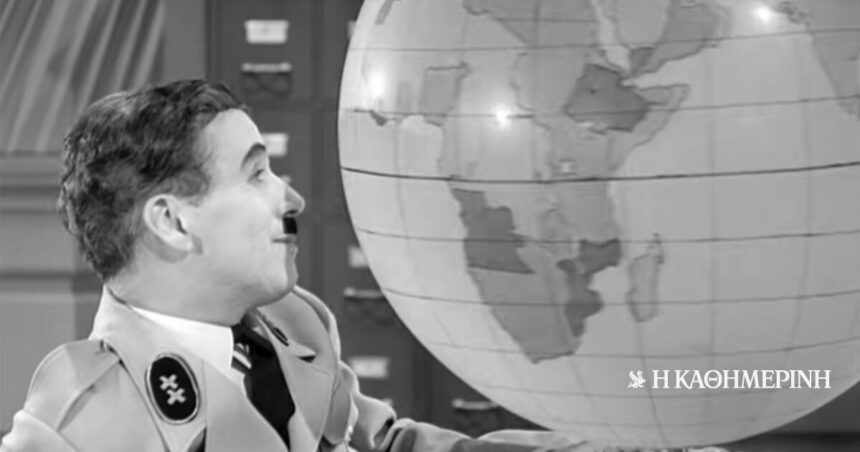The scene is familiar to everyone: Charlie Chaplin with a square moustache, dressed in military uniform playing with a comically large globe-balloon. Three and a half minutes later, the balloon pops, startling him. This scene is part of one of Charlie Chaplin’s most iconic films, entitled The Great Dictator, which was shown for the first time in New York on October 15, 1940.
This satirical masterpiece was Chaplin’s first all-sound film and demonstrated his sharp political commentary at a time when the world was on the brink of disaster. As a bold critique of Adolf Hitler and the rise of fascism, The Great Dictator ranks among the most daring films in cinema history.
Known for his beloved silent films and his trademark character, the Little Tramp, or Charlo, Chaplin had resisted the introduction of sound to cinema for years. Even in his film Modern Times (1936), long after the introduction of talking films, Chaplin chose to keep dialogue to a minimum and relied on his signature pantomime style. The Great Dictator marked a major departure from this, with the British film legend embracing sound, dialogue and monologues. Chaplin had now moved on to a next stage of producing films, which dealt with various socio-political issues of his time.
Chaplin creates a scathing satire of totalitarianism, fascism and anti-Semitism
In The Great Dictator, Chaplin plays a dual role: a lowly Jewish barber and Adenoid Hinkel, a clear parody of Adolf Hitler, capitalizing on his established resemblance to the Führer. The plot revolves around the barber, who bears a striking resemblance to Hinkel, to the extent that many mistake him for the dictator. Through this mistaken identity, Chaplin creates a scathing satire of totalitarianism, fascism and anti-Semitism. Hinkel’s regime in the fictional country of Tomainia is a direct representation of Nazi Germany and the film highlights the absurdity and brutality of a dictatorial regime.
Hinkel’s portrayal is exaggerated to the point of being comical. Chaplin imitated Hitler’s way of speaking and kinesiology, while he essentially psychographed the paranoia and ridiculous authoritarianism of the leader of the Third Reich. The film also features Napoleon, the leader of the fictional country Bactria, a parody of Italy’s Benito Mussolini, further extending the film’s critique of authoritarianism.
The speech delivered at the film’s climax was Chaplin’s direct address to the audience and remains one of the most moving cinematic moments of all time.
Perhaps the most memorable moment of The Great Dictator is Chaplin’s final speech, in which, impersonating the barber, whom those around him mistake for Hinkel, he delivers an impassioned appeal for peace, compassion and democracy. “We all want to help each other. That’s how human beings are. We want to live on each other’s happiness, not on each other’s unhappiness.” This speech, delivered at the film’s climax, was Chaplin’s direct address to the audience and remains one of the most moving cinematic moments of all time.
Releasing The Great Dictator in 1940 was a bold move. At the time, the United States was still neutral in World War II, and many influential voices in Hollywood were reluctant to produce films that were explicitly critical of Nazi Germany. Chaplin’s decision to satirize Hitler and the Nazi regime was not only risky, but also deeply personal. Although Chaplin himself was not Jewish, he was horrified by the persecution of Jews and the spread of fascism throughout Europe.
Chaplin later admitted that if he had known the full extent of the atrocities committed by the Nazis and especially the Holocaust, he might not have made the film with the same comedic tone. However, The Great Dictator was an undisputed commercial success and received five Oscar nominations, including Best Picture and Best Actor Oscars for Chaplin. It established Chaplin’s reputation not only as a comic genius but also as a director with moral values. Even today, the film remains a timeless critique of totalitarianism and intolerance.
Column Editor: Myrto Katsigera, Vassilis Minakakis, Antigoni-Despina Poimenidou, Athanasios Syroplakis




